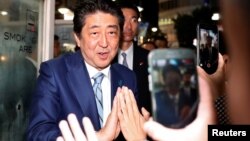As expected, Japanese Prime Minster Shinzo Abe’s ruling coalition won a decisive victory in Sunday’s early election to extend its hold on power, and to continue efforts to lift constraints on the military imposed by the country’s pacifist constitution.
“This is a very big victory given to us and I have to face this victory in a humble manner,” said Prime Minister Abe at a news conference in Tokyo on Monday.
In late September, with public support increasing for his hardline stance against the North Korean nuclear threat, Abe dissolved the lower house of parliament to call for Sunday’s “snap” election, rather than wait for the legislative term to end in December, 2018.
Super majority
Abe’s Liberal Democratic Party (LDP) and its coalition partner, the Komeito Party, won 312 seats in the 465-seat lower house of parliament known as the Diet, exceeding a two-thirds majority at 310, with opposition parties securing 143 seats, according to the Japanese public broadcaster NHK. Final results were still being tallied on Monday.
Sunday’s victory is a sharp turn-around for the prime minister, who just a few months ago was mired in domestic scandals alleging that he used his office to help friends and family, and his approval rating was near 30 percent and falling. Abe has denied the corruption charges, but a Kyodo news exit poll indicated that 51 percent of voters still don’t trust the Japanese leader.
“Some people are still very critical of us, and more than before,” Abe acknowledged at the news conference. He said his administration would be “more humble and sincere” in explaining his polices and positions.
“It is unclear whether you can call this a resounding mandate, although of course his gamble paid off. So in that sense his position has strengthened,” said Koichi Nakano, a political science professor with Sophia University in Tokyo.
The clear election victory could help Abe win another three-year term as leader of the ruling LDP next September, which would keep him in power until 2021, and make him Japan’s longest-serving prime minister.
Strong defense
Prime Minister Abe’s conservative supporters are casting this election victory as a vote of confidence for his polices to bolster the country’s defensive capabilities and to closely align with the United States.
National security has become a more prominent concern for the Japanese public in the face of North Korea’s continued threatening behavior, recently firing two intermediate range missiles over Japanese airspace and threatening to "sink" Japan into the sea.
The Abe administration has advocated for increased military spending on fighter jets, longer-range missiles, and missile defense systems. Abe also strongly supports U.S. President Donald Trump’s maximum pressure policy to use crippling sanctions and the threat of military action to force the Kim Jong Un government to give up its nuclear program.
Political gambit
In retrospect, calling an early election turned out to be a shrewd political move for the astute conservative leader, but it did carry some risk.
The emergence of a new conservative party, called Kibo no To (Party of Hope), and led by popular Tokyo Governor Yuriko Koike, emerged as a possible threat. But instead of drawing in disaffected ruling party supporters, Koike’s party split the now defunct opposition Democratic Party. The Party of Hope won 49, while the new liberal Constitutional Democratic Party of Japan won 54 seats and will become the main opposition party.
“The majority party's victory is not just because of North Korea, but because of the collapse of the opposition party,” said Japan analyst Hosaka Yuji, with Sejong University in Seoul.
Constitutional amendment
The prime minster is also intent on revising the country’s post World War II pacifist constitution to allow the military more latitude to counter potential threats from countries like North Korea and China, and to support allies like the U.S.
Amending the constitution requires a voter referendum in addition to two-thirds majority support in parliament. But the public remains divided on this issue.
“There is considerable opposition to Mr. Abe in particular about changing the constitution because he is seen as way too conservative,” said Professor Nakano.
Critics contend that loosening constraints on the military will entangle Japan in U.S. led conflicts. President Trump’s threatening rhetoric to totally destroy North Korea if attacked has heightened these concerns.
Abe said he plans to convene a special session of the Diet soon to form a new government before early November, when President Trump visits Japan and before the prime minister travels to the APEC regional economic conference in Vietnam and the ASEAN security summit in the Philippines.




